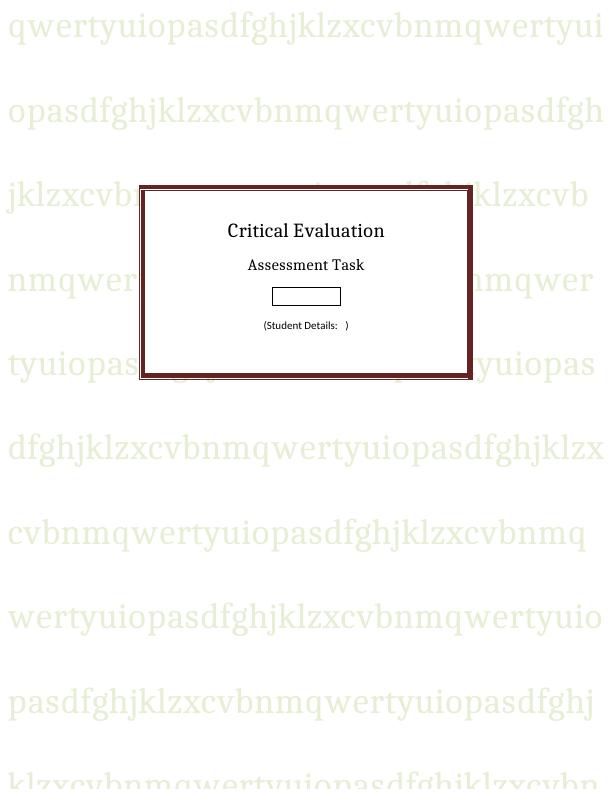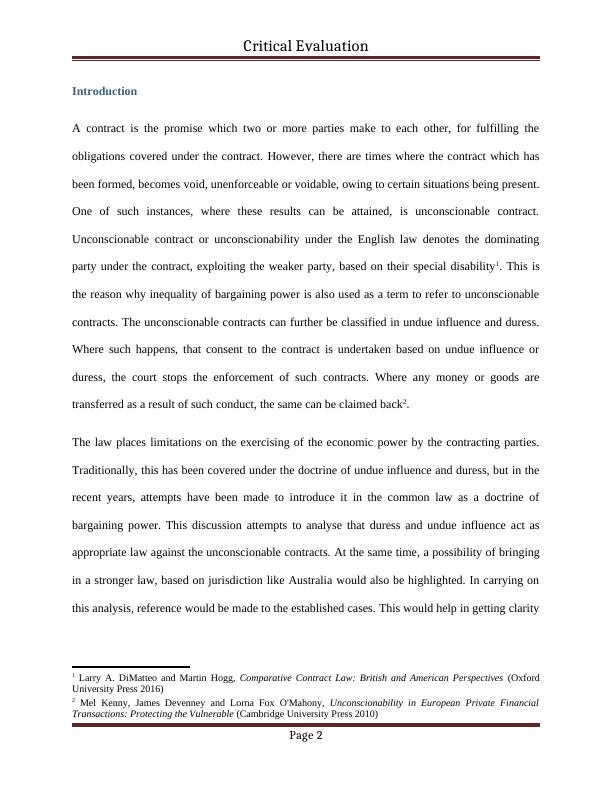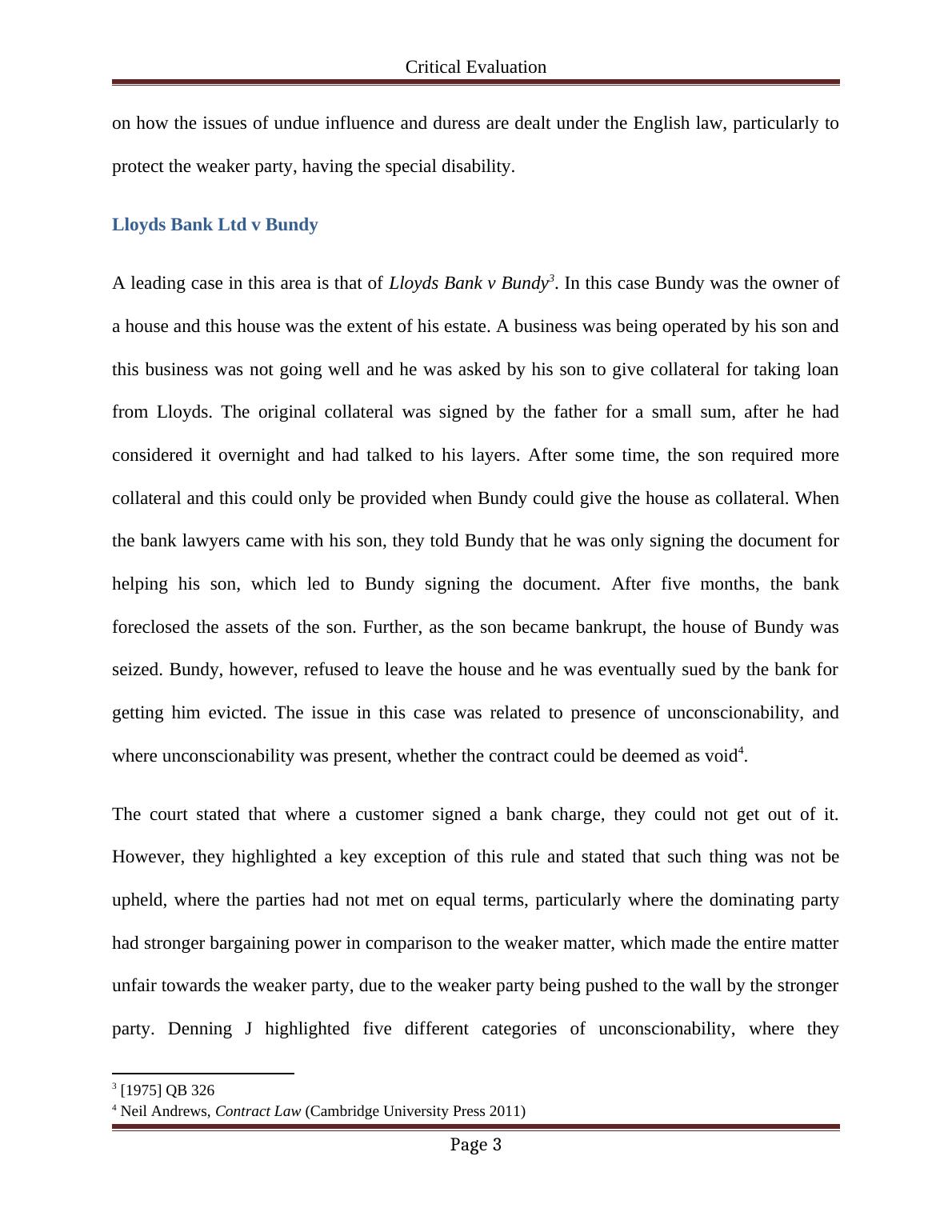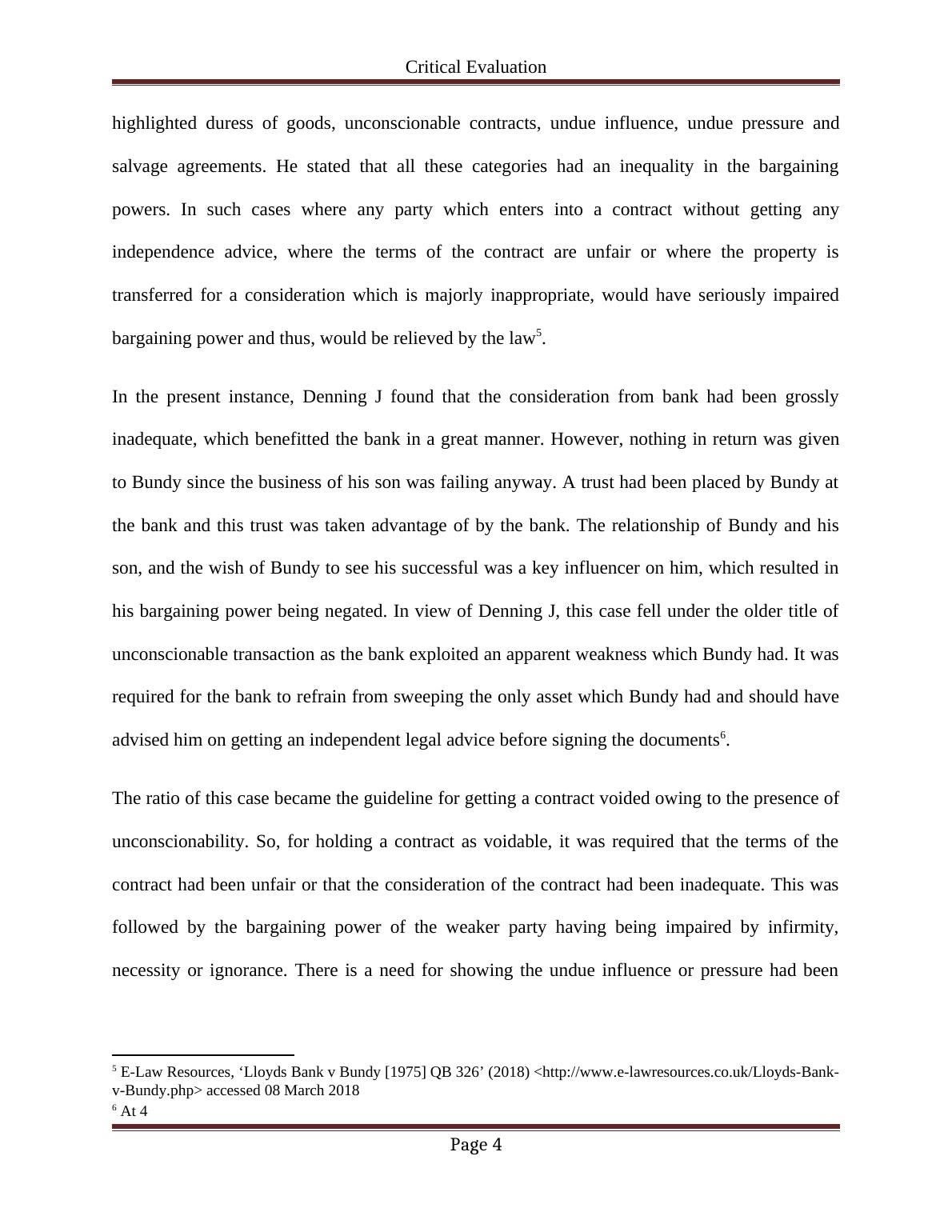(pdf) General principles of contract
Added on 2021-04-17
13 Pages3612 Words82 Views
qwertyuiopasdfghjklzxcvbnmqwertyuiopasdfghjklzxcvbnmqwertyuiopasdfghjklzxcvbnmqwertyuiopasdfghjklzxcvbnmqwertyuiopasdfghjklzxcvbnmqwertyuiopasdfghjklzxcvbnmqwertyuiopasdfghjklzxcvbnmqwertyuiopasdfghjklzxcvbnmqwertyuiopasdfghjklzxcvbnmqwertyuiopasdfghjklzxcvbnmqwertyuiopasdfghjklzxcvbnmqwertyuiopasdfghjklzxcvbnmqwertyuiopasdfghjklzxcvbnCritical EvaluationAssessment Task(Student Details: )

Critical EvaluationIntroduction A contract is the promise which two or more parties make to each other, for fulfilling theobligations covered under the contract. However, there are times where the contract which hasbeen formed, becomes void, unenforceable or voidable, owing to certain situations being present.One of such instances, where these results can be attained, is unconscionable contract.Unconscionable contract or unconscionability under the English law denotes the dominatingparty under the contract, exploiting the weaker party, based on their special disability1. This isthe reason why inequality of bargaining power is also used as a term to refer to unconscionablecontracts. The unconscionable contracts can further be classified in undue influence and duress.Where such happens, that consent to the contract is undertaken based on undue influence orduress, the court stops the enforcement of such contracts. Where any money or goods aretransferred as a result of such conduct, the same can be claimed back2. The law places limitations on the exercising of the economic power by the contracting parties.Traditionally, this has been covered under the doctrine of undue influence and duress, but in therecent years, attempts have been made to introduce it in the common law as a doctrine ofbargaining power. This discussion attempts to analyse that duress and undue influence act asappropriate law against the unconscionable contracts. At the same time, a possibility of bringingin a stronger law, based on jurisdiction like Australia would also be highlighted. In carrying onthis analysis, reference would be made to the established cases. This would help in getting clarity1 Larry A. DiMatteo and Martin Hogg, Comparative Contract Law: British and American Perspectives (OxfordUniversity Press 2016)2 Mel Kenny, James Devenney and Lorna Fox O'Mahony, Unconscionability in European Private FinancialTransactions: Protecting the Vulnerable (Cambridge University Press 2010)Page 2

Critical Evaluationon how the issues of undue influence and duress are dealt under the English law, particularly toprotect the weaker party, having the special disability. Lloyds Bank Ltd v BundyA leading case in this area is that of Lloyds Bank v Bundy3. In this case Bundy was the owner ofa house and this house was the extent of his estate. A business was being operated by his son andthis business was not going well and he was asked by his son to give collateral for taking loanfrom Lloyds. The original collateral was signed by the father for a small sum, after he hadconsidered it overnight and had talked to his layers. After some time, the son required morecollateral and this could only be provided when Bundy could give the house as collateral. Whenthe bank lawyers came with his son, they told Bundy that he was only signing the document forhelping his son, which led to Bundy signing the document. After five months, the bankforeclosed the assets of the son. Further, as the son became bankrupt, the house of Bundy wasseized. Bundy, however, refused to leave the house and he was eventually sued by the bank forgetting him evicted. The issue in this case was related to presence of unconscionability, andwhere unconscionability was present, whether the contract could be deemed as void4. The court stated that where a customer signed a bank charge, they could not get out of it.However, they highlighted a key exception of this rule and stated that such thing was not beupheld, where the parties had not met on equal terms, particularly where the dominating partyhad stronger bargaining power in comparison to the weaker matter, which made the entire matterunfair towards the weaker party, due to the weaker party being pushed to the wall by the strongerparty. Denning J highlighted five different categories of unconscionability, where they3 [1975] QB 3264 Neil Andrews, Contract Law (Cambridge University Press 2011)Page 3

Critical Evaluationhighlighted duress of goods, unconscionable contracts, undue influence, undue pressure andsalvage agreements. He stated that all these categories had an inequality in the bargainingpowers. In such cases where any party which enters into a contract without getting anyindependence advice, where the terms of the contract are unfair or where the property istransferred for a consideration which is majorly inappropriate, would have seriously impairedbargaining power and thus, would be relieved by the law5. In the present instance, Denning J found that the consideration from bank had been grosslyinadequate, which benefitted the bank in a great manner. However, nothing in return was givento Bundy since the business of his son was failing anyway. A trust had been placed by Bundy atthe bank and this trust was taken advantage of by the bank. The relationship of Bundy and hisson, and the wish of Bundy to see his successful was a key influencer on him, which resulted inhis bargaining power being negated. In view of Denning J, this case fell under the older title ofunconscionable transaction as the bank exploited an apparent weakness which Bundy had. It wasrequired for the bank to refrain from sweeping the only asset which Bundy had and should haveadvised him on getting an independent legal advice before signing the documents6. The ratio of this case became the guideline for getting a contract voided owing to the presence ofunconscionability. So, for holding a contract as voidable, it was required that the terms of thecontract had been unfair or that the consideration of the contract had been inadequate. This wasfollowed by the bargaining power of the weaker party having being impaired by infirmity,necessity or ignorance. There is a need for showing the undue influence or pressure had been5E-Law Resources, ‘Lloyds Bank v Bundy [1975] QB 326’ (2018) <http://www.e-lawresources.co.uk/Lloyds-Bank-v-Bundy.php> accessed 08 March 20186At 4Page 4

End of preview
Want to access all the pages? Upload your documents or become a member.
Related Documents
Difference between Duress and Undue Influencelg...
|5
|977
|30
Unconscionable Conduct in Louth v Diprose (1992) - Business Lawlg...
|6
|977
|131
Unconscionability in Common Law and Statutory Law of Australialg...
|9
|2587
|62
Business Law Assignment Unconscionabilitylg...
|10
|2643
|83
Unconscionable Conduct and Misrepresentation in Contract Lawlg...
|8
|2229
|411
Unconscionable Conducts in The Contractslg...
|12
|3463
|53
